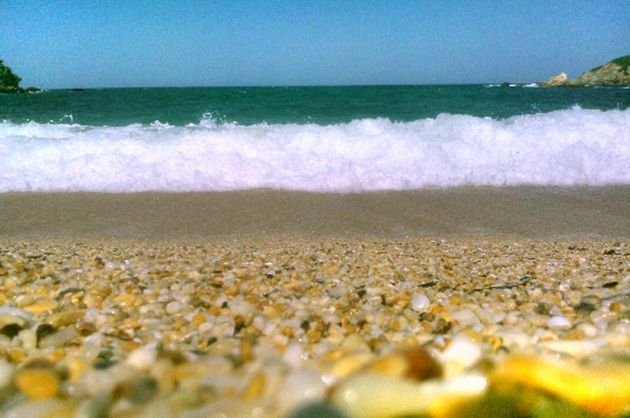-
 Podcast - How much is Greece getting out of the RRF?
Podcast - How much is Greece getting out of the RRF?
-
 Podcast - Between investment grade and rule of law: Greece's contrasting images
Podcast - Between investment grade and rule of law: Greece's contrasting images
-
 Where is Greek growth coming from?
Where is Greek growth coming from?
-
 Bravo, Bank of Greece
Bravo, Bank of Greece
-
 Podcast - A year on from Tempe train crash, trust fades as questions mount
Podcast - A year on from Tempe train crash, trust fades as questions mount
-
 Podcast - SYRIZA embraces the chaos
Podcast - SYRIZA embraces the chaos
On the beaches

The quality of the water at 94 percent of Greek beaches was deemed excellent by the Foundation for Environmental Education (FEE), which awarded 408 Blue Flags to Greece this week, the second highest of the 48 countries the organization surveys. The high rating is testament to the care given local authorities, bathers, tourists, volunteers and Mother Nature.
Greeks have long had a bittersweet relationship with the beach, that sandy or pebbly segue to the sea. It is the point from which expectancy but also yearning emanates, sentiments that Giorgos Seferis captured in his poem "Denial" some decades ago:
On the secret seashore
white like a pigeon
we thirsted at noon:
but the water was brackish.
On the golden sand
we wrote her name;
but the sea-breeze blew
and the writing vanished.
In more recent years, beaches have become the places where Greeks and visitors to the country bare it all, figuratively and literally: from emotions to muscles and bikini lines. So much so, in fact, that the Tourism Ministry commissioned a video last summer to suggest that Greeks should tone down their behaviour to ensure that tourists had a pleasant time.
Apart from the video's disparaging theme, which sees Greeks as uncouth natives who get in the way of their sophisticated visitors, the short animation also highlighted Greece's inability to place itself in the modern world. "Greece: The richest place in the world," boasted the campaign. But isn't one of the most important ingredients for a country's richness its people: The same people that the video treated so disparagingly? Isn't another vital element of its richness its natural beauty and the way it weaves itself into the country's culture: The same natural beauty that the ad spot reduces to just a cheap playground for tourists?
The reality is that Greek decision makers rarely display any grasp of what gives Greece a touch of uniqueness or where its "added value" lies. Too often they are stuck working and re-working old ideas that are devoid of any imagination.
This was emphatically driven home by the legislation on the country’s coastline put to public consultation recently by the Finance Ministry. The draft law proposes a complete relaxation of restrictions on building and commercial activity on Greece's stunning coastline. Its proposals include allowing the legalisation of illegal coastal developments after the payment of fines, permitting the construction of permanent structures on beaches, relaxing restrictions on beach concessions and limiting Greeks' right to free access to the seashore, which is defined as a "public good" by article 24 of the Greek constitution.
The legislation has already drawn condemnation from environmental groups and tens of thousands of Greeks have signed an online petition to have the bill scrapped. Only those with little understanding or respect for the true value of what surrounds them could put forward such proposals. To sacrifice what should be protected is a denial that Greece's coastline and those who cherish it do not deserve. It brings us back to the poet's lament and his last verse:
With what spirit, what heart,
what desire and passion
we lived our life: a mistake!
So we changed our life.